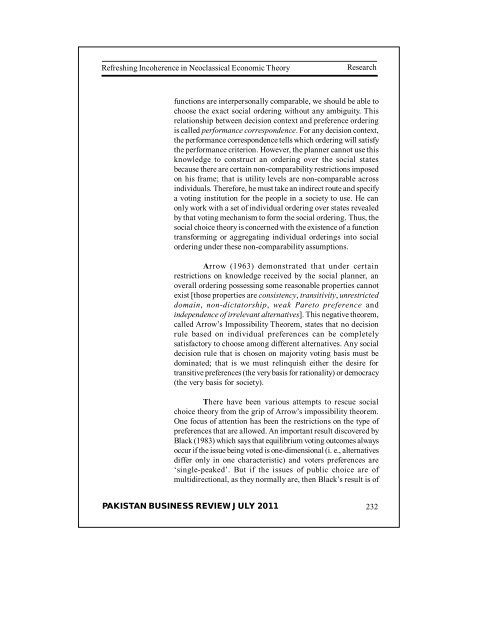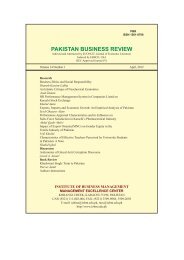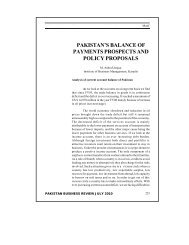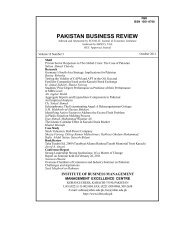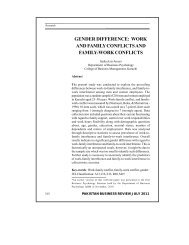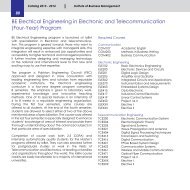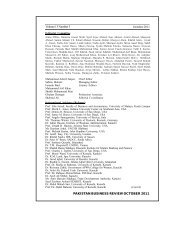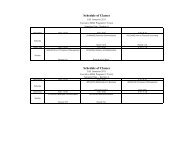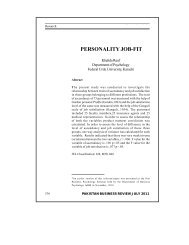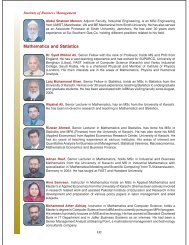PAKISTAN BUSINESS REVIEW - Institute of Business Management
PAKISTAN BUSINESS REVIEW - Institute of Business Management
PAKISTAN BUSINESS REVIEW - Institute of Business Management
Create successful ePaper yourself
Turn your PDF publications into a flip-book with our unique Google optimized e-Paper software.
Refreshing Incoherence in Neoclassical Economic Theory<br />
Research<br />
functions are interpersonally comparable, we should be able to<br />
choose the exact social ordering without any ambiguity. This<br />
relationship between decision context and preference ordering<br />
is called performance correspondence. For any decision context,<br />
the performance correspondence tells which ordering will satisfy<br />
the performance criterion. However, the planner cannot use this<br />
knowledge to construct an ordering over the social states<br />
because there are certain non-comparability restrictions imposed<br />
on his frame; that is utility levels are non-comparable across<br />
individuals. Therefore, he must take an indirect route and specify<br />
a voting institution for the people in a society to use. He can<br />
only work with a set <strong>of</strong> individual ordering over states revealed<br />
by that voting mechanism to form the social ordering. Thus, the<br />
social choice theory is concerned with the existence <strong>of</strong> a function<br />
transforming or aggregating individual orderings into social<br />
ordering under these non-comparability assumptions.<br />
Arrow (1963) demonstrated that under certain<br />
restrictions on knowledge received by the social planner, an<br />
overall ordering possessing some reasonable properties cannot<br />
exist [those properties are consistency, transitivity, unrestricted<br />
domain, non-dictatorship, weak Pareto preference and<br />
independence <strong>of</strong> irrelevant alternatives]. This negative theorem,<br />
called Arrow’s Impossibility Theorem, states that no decision<br />
rule based on individual preferences can be completely<br />
satisfactory to choose among different alternatives. Any social<br />
decision rule that is chosen on majority voting basis must be<br />
dominated; that is we must relinquish either the desire for<br />
transitive preferences (the very basis for rationality) or democracy<br />
(the very basis for society).<br />
There have been various attempts to rescue social<br />
choice theory from the grip <strong>of</strong> Arrow’s impossibility theorem.<br />
One focus <strong>of</strong> attention has been the restrictions on the type <strong>of</strong><br />
preferences that are allowed. An important result discovered by<br />
Black (1983) which says that equilibrium voting outcomes always<br />
occur if the issue being voted is one-dimensional (i. e., alternatives<br />
differ only in one characteristic) and voters preferences are<br />
‘single-peaked’. But if the issues <strong>of</strong> public choice are <strong>of</strong><br />
multidirectional, as they normally are, then Black’s result is <strong>of</strong><br />
<strong>PAKISTAN</strong> <strong>BUSINESS</strong> <strong>REVIEW</strong> JULY 2011<br />
232


